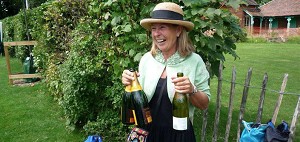
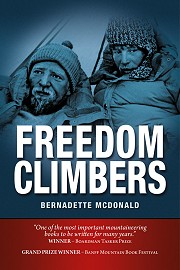
In this exclusive excerpt author Bernadette McDonald introduces the book's three central characters, Wanda Rutkiewicz, Jerzy 'Jurek' Kukuczka and Voytek Kurtyka, as they approach K2 Base Camp in 1982. Wanda would go on to become the first woman to climb K2, and would ultimately complete eight of the fourteen 8000m peaks. Jurek was the second climber to complete all fourteen 8000m peaks (after Reinhold Messner), taking only eight years to complete the feat and establishing ten new routes in the process and climbing four peaks in winter. Voytek Kurtyka took part in several high profile expeditions to the Himalaya before becoming a pioneer of the lightweight 'alpine' approach to climbing difficult faces on the highest peaks.
- Freedom Climbers is now available in the UK in both paperback and eBook from Vertebrate Publishing.
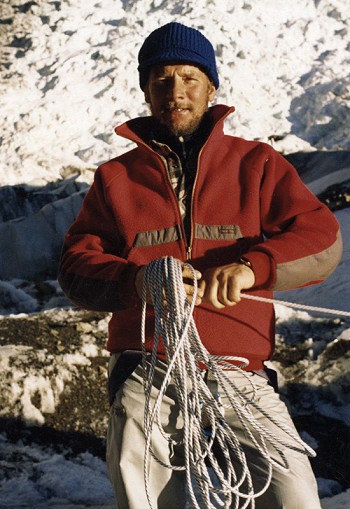
Crutches to Crampons
The trail was rough. Boulders of all sizes tottered underfoot and treacherous ice patches lurked under a thin layer of unstable sand. The ground trembled from the roar of the murky Braldu River, far below. A gaunt, hollow-cheeked woman hobbled along, pain clouding her dark eyes. She stopped and leaned against a crumbling rock wall. Reaching into her pocket, she found two painkillers and tossed them into her parched mouth.
It was 1982. Wanda Rutkiewicz was the most famous female Himalayan climber in the world. Her specialty was all-women teams. This was to be her summer: she had assembled a group of 12 women, all top climbers, many of them former climbing partners, for an ascent of K2, the second highest mountain in the world. There was only one problem – Wanda was on crutches. She had shattered her femur in the Russian Caucasus Mountains a year earlier and there had been complications.
Most people would have abandoned the idea of hobbling in to K2 on crutches, but Wanda, like so many Polish alpinists, had been forged to an unimaginable level of toughness and determination. K2 was Wanda's dream, and she wanted to see it through, at least as far as base camp.
Grim-faced and intent, she limped along the 150-kilometre approach march, trying to keep up with the others. Her crutches teetered on the overhanging cliffsides as she balanced on the pencil-thin trail. Hour after hour. Day after day. The villagers were dumbstruck when they saw her – this exceptionally beautiful and rather small woman – forging ahead on crutches through the Braldu Valley. The local porters, who knew her from previous expeditions, were so in awe of her bravery that they began to inscribe messages on the rocks: "Long live Wanda. Viva Wanda."
After several days she reached the Baltoro Glacier, where the trail worsened.
Pebbles and boulders gave way to large talus. As each pair of crutches disintegrated from the punishing route, she would haul out a fresh set. Her hands hung with shreds of blistered skin, and her armpits were rubbed raw.
Wanda was still a few hours from base camp when exhaustion overwhelmed her. Unaware of the magnificent granite walls around her, she slumped down on a rock, massaged her throbbing leg, and silently began to weep. This was how her fellow Polish climbers, Jerzy Kukuczka and Voytek Kurtyka, found her as they made their way to K2 base camp. The indestructible, bearish Kukuczka, known by all as "Jurek," couldn't help himself: he scooped her up and began to carry her. Voytek, slender and wiry, took her crutches. Alternating loads, the two carried Wanda the remaining distance.
In truth, Jurek didn't think much of women's expeditions, even though he admired Wanda. He supposed that she viewed climbing as a competitive sport, which was why she insisted on climbing with, and being compared to, other women. He just wanted to go climbing. Most of his male counterparts felt the same. Nevertheless, Wanda was well connected and had managed to get a climbing permit for K2. If he and Voytek could tag along, they weren't too proud to do it.
Since Voytek knew her better, it was he who had negotiated their places on her permit. They wouldn't get in her way, he promised, or climb on her route. He knew it was important to Wanda that her all-women's expeditions at least be perceived as being unsupported by men. As far as the Pakistani authorities knew, he and Jurek were along as official photographers and reporters, as well as to protect the ladies in a Muslim country.
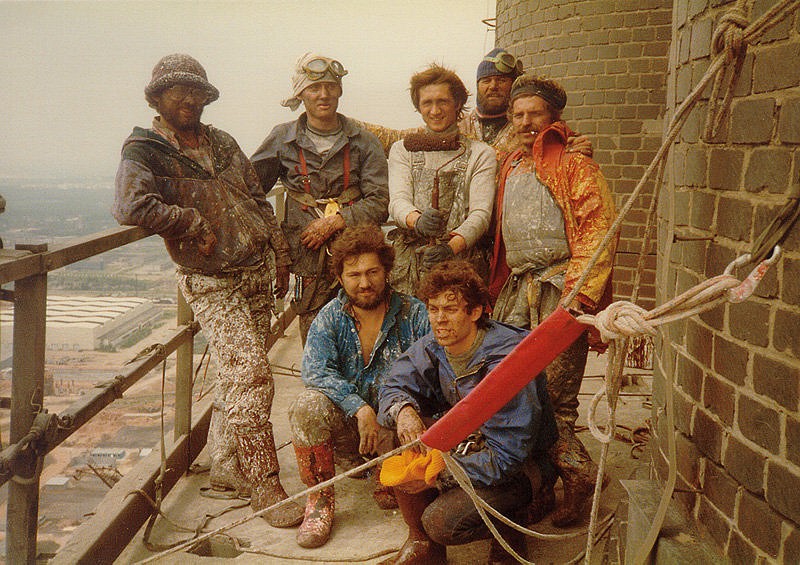
He understood Wanda's wishes, and he respected them. This was characteristic of Voytek. Unlike some of his more plain-spoken fellow climbers, he was thoughtful and careful about what he said. His powers of observation were impressive, not just of facts, but of nuance and attitude and feeling. Known as a "thinking man's" climber, he came from an educated and cultured background and was able to demonstrate his remarkable curiosity in a number of languages.
Now in his early thirties, Voytek came from the small village of Skrzynka in western Poland, in what formerly was German territory. There, he spent his early years surrounded by nature. A move to the war-ravaged city of Wrocław at age 10 sank Voytek into a childhood depression. Studying electrical engineering in university did little to improve his spirits. Then he encountered rock climbing. His natural aptitude for climbing on rock garnered him the nickname zwierz, or "animal." He immediately grasped that climbing was a kind of addiction for him. Little did he understand how serious a trap that addiction could become.
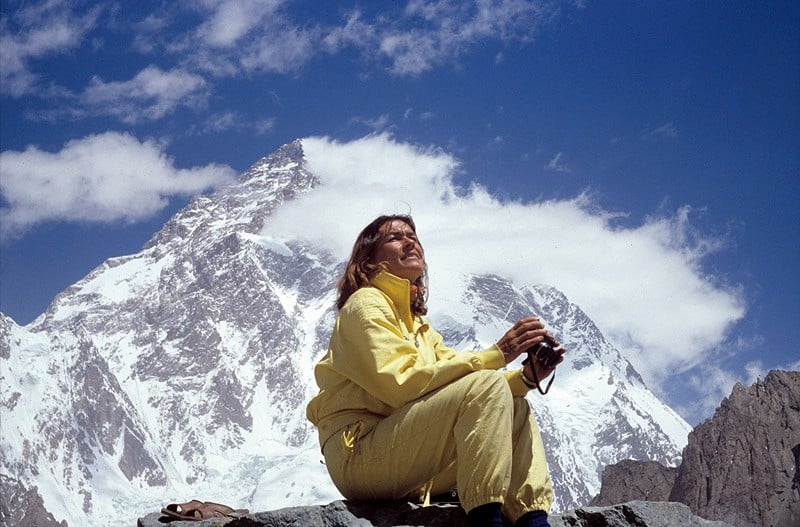
A year younger than his intense friend, Jurek Kukuczka was built solid and stocky, while the slender Voytek was coiled tight like a spring. Jurek was a man of few words. If anything caught one's attention, it was his eyes. They were warm and friendly, with just a hint of a smile. Born in 1948, Jurek, like so many of Poland's leading climbers, studied electrical engineering at university. This prepared him well for work in the coal-mining industry that dominated the Katowice area of southwestern Poland. But his life was climbing. From the first time he touched rock at the age of 17, he felt a surge of power that ultimately propelled him to the world's highest summits. And in the mountains, he was unstoppable.
Jurek, Voytek and Wanda: three climbing legends, all in Pakistan with the same goal – to climb what was widely accepted as the most difficult of the 14 peaks that exceed that magic height, 8000 metres. Their fierce resolve and tireless motivation had made these three among the most highly respected climbers in the world. Yet nothing about their position in the mountaineering world was accidental. Their brilliant careers as alpinists had begun humbly; but like so many, they were shaped by the violent devastation into which they were born – a country plagued by wars, then carved up and dominated by two stern masters: Germany and Russia. And although Wanda, Jurek and Voytek were among the lucky ones to survive, the terrors of war helped shape their resilience and toughness. For all of these elite climbers, the story was the same: history had hardened both their bodies and their minds. They weren't just climbers. They were Polish climbers.
Exclusive excerpt from Freedom Climbers by Bernadette McDonald.
© Bernadette McDonald/Vertebrate Publishing 2012.
No reproduction without the express permission of the publisher.

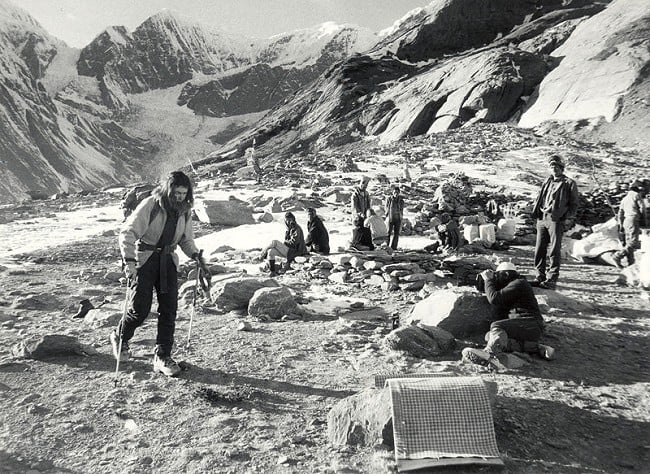







Comments